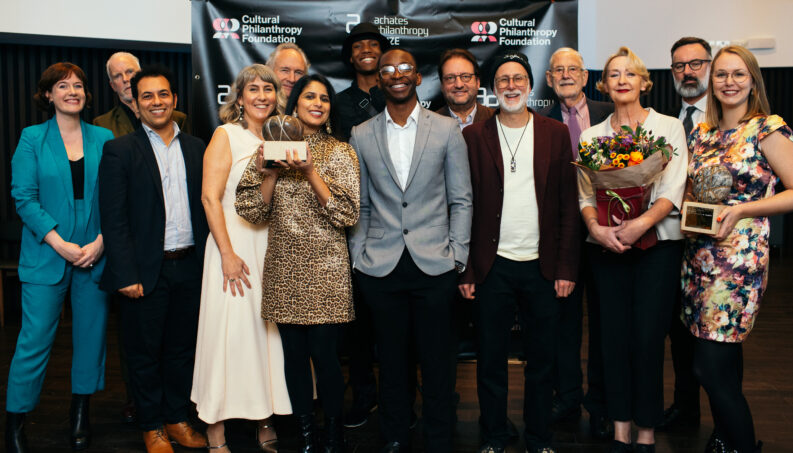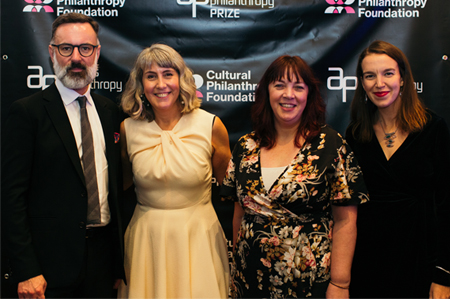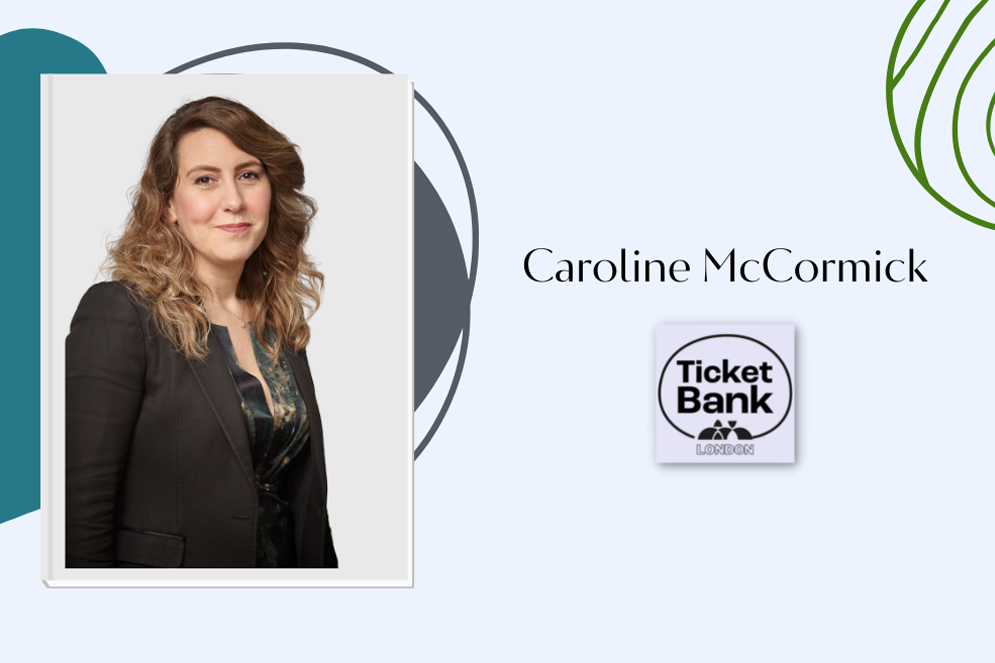The Women’s Prize Trust is always looking for meaningful ways to make books and reading more accessible which is why we’re thrilled to be partnering with The London Ticket Bank.
This partnership will provide free tickets to individuals facing barriers to attending cultural events, to ensure open access to Women’s Prize LIVE and other events. The London Ticket Bank is for charities and community organisations that want to improve access to the arts for their members.
We caught up with co-founder Caroline McCormick, who also runs the Achates Philanthropy Prize to ask her a few questions.
Please tell us a little bit about The London Ticket Bank.
The London Ticket Bank is a one-year programme from the Cultural Philanthropy Foundation in partnership with Cardboard Citizens, connecting people who wouldn’t otherwise be able to engage with free / donate what you can tickets from 30 cultural institutions, including theatres, galleries and arts centres, during the cost-of-living crisis. I am one of the co-founders, along with Chris Sonnex, Artistic Director of Cardboard Citizens.
What makes it so unique?
It’s very special to have so many cultural organisations, including the Women’s Prize Trust, coming together to meet a shared challenge. We are honoured to be trusted by so many organisations to support them in meeting their ambitions to engage diverse audiences at this time.
What are your ambitions for The London Ticket Bank?
We know that the reasons why people don’t engage with culture are as diverse as people are themselves. The London Ticket Bank can’t address all of these barriers, what it can do is very simply to connect people who want to engage with culture, but face economic barriers, to do so with free / donate what you can tickets through mainstream charity partners. For this reason, the project is for one year only, as after that we would need to start to look at more systemic issues. So, our ambition is to simply connect people with tickets. However, we do also hope that during the year new links will be forged that will lead to longer term partnerships between cultural organisations and mainstream charity partners, creating ongoing pathways for participating audiences.
How has your career evolved over the years?
There are two ways in which I can answer this question: Firstly, that as someone who has spent a considerable portion of their career as a fundraiser and has worked to both reclaim the idea of philanthropy and to democratise cultural philanthropy through initiatives such as the Achates Philanthropy Prize, being a fundraiser was probably an inevitability for me as I organised my first fundraising event aged 8. For me philanthropy is a way of life, being part of your community and giving, knowing that you will always get back more than you give.
The second answer is that I couldn’t see a pathway to a career in culture until I moved to London and my boss got a job at the National Theatre and invited me to apply for a role as Head of Trust Fundraising as a result of something a bit radical I had done whilst working for her at the RNID – I noticed that the charity wasn’t accessing any European funding and that knew that this was a major opportunity. So, I left a note for the Chief Executive that said, “I know how we can get a million pounds”. I am slightly amused to think that I did that now, but thankfully he came down to see me and asked me to tell him more. We raised so much money that when I left, they replaced me with seven people. But what I haven’t forgotten is that without that invitation, I may never have found my way to the cultural sector and so democratising those pathways to culture remains important to me.

What would you say is your chief motivation in the work that you do?
My sister and I are adopted and being adopted often gives you empathy as your superpower. My mother was a designer and after adopting my sister and me, a freelance artist, so culture and creativity have always been a fundamental part of my daily life. When I was interviewed for my first job in culture, at the National Theatre, I was asked what the last show I had seen at the NT was and had to explain that with no ticket schemes in place at that time, I couldn’t afford to see the work. There was obvious discontent in the room, but Lady Susan Chinn a Trustee who was part of the interview process, asked me what I had seen recently, and I described the Hitchcock season I’d been enjoying at the BFI, and we ended up having a discussion about the cinematography of Rear Window. She then turned to the rest of the panel and said, “she’s smart – she just can’t afford a ticket”.
I’ve never forgotten that moment and in many ways that activated the strong sense of social justice I inherited from my father. Not long after joining, I was lucky enough to start working on the first ticket scheme I have been involved with, The Paul Hamlyn Nights, so it is very special to me that the NT were one of the 7 cultural organisations we were able to launch the London Ticket Bank with. Today, I am a passionate advocate of the fact that access to culture is a human right, and one from which many people are excluded, even in the UK which has many remarkable cultural organisations. I founded the Cultural Philanthropy Foundation in 2016 to promote the democratisation of culture and in The London Ticket Bank we have the opportunity to address one of those barriers.
If you weren’t doing this, what would you be doing instead?
My role as Chair of The Cultural Philanthropy Foundation is a voluntary role so it sits alongside my job as Director and founder of cultural sector consultancy company, Achates. Achates is a strategy, fundraising and recruitment consultancy. The work is complementary, but separate – Achates is about helping cultural organisations to find practical solutions to the challenges they face with and for their audiences, whereas the Cultural Philanthropy Foundation is much more focused on thought leadership and trying to find new answers to longstanding questions. Having said that, anyone who knows me well knows that I write and that I have a not-so-secret penchant for interior design.
What are the joys and challenges you face in your work?
I feel extremely privileged to work with hundreds of cultural organisations and to understand the challenges they face. We build close partnerships with our clients and that brings responsibility which both makes everything worthwhile and at moments when all of the sector is on a shared deadline, can be a little overwhelming. We are currently facing one of the most challenging times for culture I have ever known, as there isn’t enough money from either the state or voluntary income sources to meet all everyone’s needs and we know a lot of cultural organisations are going to close as a result, I find not having an answer to that extremely hard.

You help charities and cultural organisations problem-solve; how do you unwind from that?
All of the things that I mention here – being creative, swimming, walking, but ultimately that release is really just a process of finding inspiration and beginning again.
Is there a place you visit or a thing you do when you’re stuck and looking for inspiration/comfort?
My husband thinks that I am one part fish as I try and swim most days and I am definitely a better and more creative person when I’ve been swimming or have been to look at the ocean. We spend every other weekend at our house in North Yorkshire and I find walking in the Lake District puts everything into perspective.
What’s the best advice you’ve ever been given?
My mentor was a brilliant woman, Vivien Wallace, who even though I didn’t work for her at the NT, took me under her wing and got me to work on the Paul Hamlyn Nights, and I later worked with her at The Old Vic Theatre. She nurtured a whole generation of us in the cultural sector, helping us all to find our way. At moments of real difficulty, I still try to channel her, you never regret being elegant on the surface, no matter how hard you may be paddling underneath.
What advice would you give to someone starting out in the charity/cultural sector who wants to make a difference?
My good friend Suzanne Alleyne invited me to deliver a seminar with her as part of the King’s College MA in Cultural Management for a number of years and I was always surprised by the limited extent to which any discussion of money came into the curriculum. When we explained to the students that that they will be thinking about money almost every day and that every one of them needed to be a fundraiser, it was always a bit of a shock and like many people, they found the idea a bit uncomfortable. The key to challenging this is always to explain that as charities cultural organisations aren’t fundraising for themselves as the beneficiaries, they are fundraising to create the work with and for their audiences. So, to be a purposeful leader in culture you need to think about how you will balance the triple bottom line of art, audiences, money.
What’s next for you?
Culture is facing an unprecedented period of financial pressure so the work of the Cultural Philanthropy Foundation is more important than ever, and we have exciting plans which were put temporarily on hold to enable us to develop and launch The London Ticket Bank – 2023 will see our inaugural Thought Leadership Lecture and a national campaign celebrating the value and impact of culture.
Finally, everyone seems to think the idea is hilarious, but I am going down to four working days a week from April so that I can spend more time travelling, writing and at our house in North Yorkshire with my husband, who will be 70 this year. I love what I do, but it’s not the only thing that matters to me.
And lastly, because we always love a good recommendation, what was the last book by a woman that you recommended to a friend?
The Rachel Cusk Outline Trilogy holds particular significance for me and also enables me to cheat and recommend three books in one. I specialised in Dirty Realism whilst studying my MA in Contemporary Writing, and my husband, Bill Swainson, edited authors including Raymond Carver. But I struggled with the representation of women in many of those books. Rachel Cusk brings a feminist perspective to that style, and a brilliantly honest one writing as she does out of absence into creating the shape of herself through the series.








